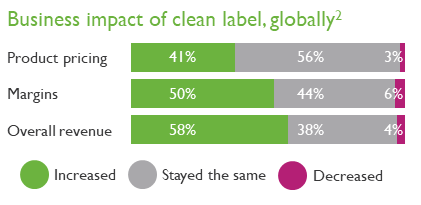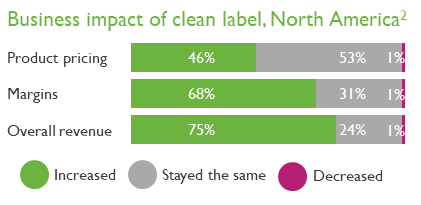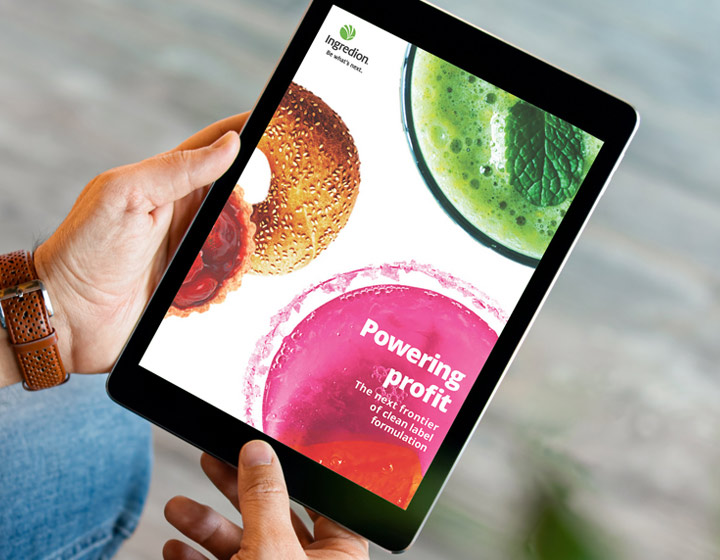Discover what a clean label strategy can mean for the growth trajectory of your brands — and what the most successful manufacturers do differently to drive more clean label success.

Discover what a clean label strategy can mean for the growth trajectory of your brands — and what the most successful manufacturers do differently to drive more clean label success.
Food and beverage manufacturers continue to face headwinds as they reformulate or innovate their packaged goods. While navigating issues of inflationary pressures, supply chain constraints and widely varied consumer preferences, they must stay focused on the goal — helping their brands deliver the great eating experiences and the valued attributes consumers demand most.
Today, one clear way forward is a clean label approach — utilizing the ingredients that consumers recognize and feel good about choosing. By formulating with familiar consumer-preferred ingredients, manufacturers can position their brands to win with a growing group of consumers willing to pay more for the clean label products that match their values — and enable their brands to capture tangible gains in revenue, margin and pricing.
Ingredion proprietary research shows the clean label movement is gaining momentum for consumers and manufacturers alike:
With great opportunity comes some challenges. Ingredion's proprietary Global Clean Label Manufacturer Study found about nine of 10 global food and beverage manufacturers say they have challenges formulating with clean label ingredients.2 That's because a significant R&D effort is required to retain the brand’s expected taste and texture in clean label products — not to mention the sourcing challenges, fear of potentially higher ingredient costs and product quality and shelf-life concerns. This makes finding the right strategic partner even more important to innovation and renovation projects.
There's a good reason for manufacturers to press forward, despite the hurdles: growth potential. The 2021 Global Clean Label Manufacturer Study found that converting product to clean label led to average self-reported gains of 15% in overall revenue, 11% in margins and 18% in product pricing.2
That's an impressive payback, even if the gains are not distributed evenly. About half or more of manufacturers worldwide are saying their clean label efforts have been able to increase revenues and margin, with about four in 10 reporting desired pricing improvement.

Success rates vary greatly from region to region, but most manufacturers have been able to either maintain or improve their financial performance by implementing a clean label strategy, while adding valuable benefits that build consumer loyalty. In fact, 75% of North America manufacturers reported that they were able to increase overall revenue, and 68% reported an increase in margin.2

While this study cannot answer all of our questions about the causal factors driving clean label success for some regions over others, there are some significant differences in how manufacturers approach capturing the opportunity.
Overall, North American manufacturers self-report a clear and elevated cross-functional focus on clean label activities. It is central to and integrated into all aspects of the brand, business and marketing strategy. This high level of focus and cross-functional participation in bringing the strategy to life may be contributing to the more impressive business results.
This becomes clear in the following summary of key differences reported in the study:2
The bottom line for food and beverage brands: Clean label is proving to be a crucial route for manufacturers to fulfill consumer needs, build brands and potentially improve their financial results. For more reliable success with clean label efforts, our survey suggests making a strong companywide commitment to an ongoing clean label strategy, working closely with capable clean label suppliers and investing in multichannel marketing. All of these appear to be factors that contribute to the most favorable clean label business impacts.

Download the full report from our latest clean label research for more insights into how your competition is using clean label to improve their brand loyalty and financial performance.
Learn more about the consumer, brand and business value of clean label. Visit our clean and simple page or contact our experts.
1ATLAS, Ingredion Proprietary Global Consumer Research, 2020
2ATLAS, Ingredion Proprietary Global Manufacturer Research, 2021